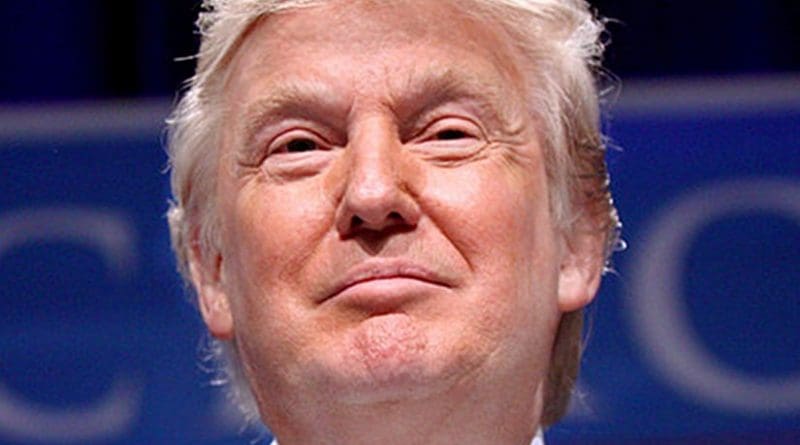President Trump’s Prospects For The Middle East – Analysis
By IPCS
By Derek Verbakel*
Predicting the implications of Donald Trump’s presidency for the Middle East requires informed guesswork in drawing links from campaign rhetoric to a more coherent approach or ensuing foreign policy. Trump, who apparently favours ‘isolationism’, seems averse to the United States’ longstanding bipartisan pursuit of overambitious policies in the region. His discourse reflects a shallow and myopic worldview privileging winner/loser binaries over interdependency, and he identifies little to gain from a Middle East wracked by complex and chaotic conflicts. His administration appears poised to shift the methods of US military interventions in the region and recalibrate relations with several regional actors. Such an approach could further churn an already unstable Middle East.
Trump’s foreign policy direction will be heavily influenced by the advisors and officials surrounding him. The current roster portends an inflow of deeply ideological thinking ill-suited to apprehending the complexities of regional politics. National Security Advisor Lt. Gen. Michael Flynn sees an existential threat posed by so-called ‘Islamic terrorism’, which he conflates with ‘Islam’ and ‘Islamism’. Walid Phares, a key Trump advisor and former ideologue of a sectarian Christian militia during Lebanon’s civil war, also propounds a variant of long-discredited ‘Clash of Civilizations’ theory. The incoming Secretary of State can be expected to hold similar views.
Such an outlook will guide US policy in Iraq and Syria, where Trump appears committed to reducing the presence of American ground personnel while sustaining military pressure to combat designated terrorist groups. Trump suggests he will coordinate – if not collaborate – with Russia, Syrian President Assad’s main backer beside Iran, which would be interpreted by the pro-Assad coalition as a green light to intensify their brutal campaign to recapture territory from rebels. But untold consequences could emerge from resulting growth of Russian influence in the Middle East.
Also likely will be a withdrawal of US support to more ‘moderate’ opposition forces in Syria, who will continue to dwindle while targeted alongside extremist al-Qaeda-affiliates and IS by Assad-aligned forces. This would advance the narratives and leading position of extremists within the opposition, who will never disappear while Assad remains in power. Absent a widely accepted political ‘solution’, this would prolong the conflict and increase displacement of Syrians inside and outside the country. Trump advisors have also called for more US airstrikes in Iraq and Syria with less emphasis on avoiding civilian deaths, and this too would fuel radicalism in these countries and worldwide.
Trump may also seek closer relations with regional leaders more sympathetic to his stance on Syria and whose authoritarian leanings elicit his admiration. Alongside Assad and others, Egypt’s Sisi and Turkey’s Erdoğan could reinforce a decades-old US policy of prioritising ‘stability’ under repressive leaders over the pursuit of democratic transformations and human rights in the region.
Also necessary will be to account for the wishes of regional allies, particularly among the Gulf Arab states, to see Assad unseated and Iran’s growing regional power thereby diminished. Indeed, Trump’s supposed Syria policy would spare Iran a huge geopolitical blow, as the Assad regime’s survival anchors Iran’s spheres of influence extending through Baghdad and Damascus to Beirut.
Trump has stated the 2015 Iran nuclear deal will be renegotiated. Yet there would be no appetite for this from Iran or the remaining P5+1, who derive economic and security benefits from the agreement. Unilaterally dismantling the agreement would be infeasible, and given Iran’s significant role in Iraq and Syria, he will be restrained by the need to maintain a working relationship with Tehran to fight IS.
Trump could attempt to subvert the deal in various ways. However, widespread perception in Iran of Washington’s treacherousness could vindicate and benefit rivals of President Rouhani. Seeking re-election in May 2017 and to further ‘normalise’ Iran’s international relations, Rouhani touts the deal as a huge triumph. But with an electoral victory, hardliners could pursue an agenda to resume Iran’s nuclear program without international monitoring. A new phase of conflict drawing in the US, Israel, and the Gulf sheikhdoms could result from steps in this direction.
Also of interest to Israeli Prime Minister Netanyahu is that unlike previous US presidents from both parties, Trump claims Israeli settlement expansion in the West Bank is not an obstacle to reaching an Israeli-Palestinian peace accord. While Trump is unlikely to pronounce dead the ‘two-state solution’ which all interested parties purportedly desire, there will be no significant pressure on Israel to halt construction of settlements deemed illegal under international law.
Trump has claimed he will resolve the Israeli-Palestinian conflict. But due not only to alienation from much of the Republican foreign policy establishment, he lacks capable and inclined diplomats and a plan for them to carry out. A substantial diplomatic initiative from Washington is at best a distant prospect, and absent any progress towards curbing systemic violence against Palestinians or their accession to statehood, chances of another Palestinian uprising and more attacks inside Israel will increase.
Of little concern to Trump will be the consequences of his policies for the welfare of the Middle East’s peoples. They, like regional leaders, hold mixed opinions on the promise his presidency brings. But widely anticipated is that as the Trump administration and its foreign policy trajectories take shape, so too will ramifications for stability in the Middle East.
* Derek Verbakel
Researcher, IReS, IPCS


ISIS is fighting Assad’s government in Syria, and pro-Iran government in Iraq. So why Trump should fight ISIS? The logical approach for Trump’s administration would be the same that has been followed by the previous administrations: support ISIS, Saudi-Arabia, and the Persian-gulf Arab states, and impose sanctions or war against Iran.